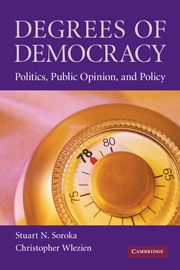Book contents
- Frontmatter
- Contents
- Preface
- Degrees of Democracy
- 1 Public Opinion and Policy in Representative Democracy
- 2 The Thermostatic Model
- 3 Adding Issues and Institutions
- 4 Public Preferences and Spending
- 5 Parameters of Public Responsiveness
- 6 Public Responsiveness Explored
- 7 Policy Representation
- 8 Disaggregating Public Responsiveness and Policy Representation
- 9 Degrees of Democracy
- Appendix
- Bibliography
- Index
9 - Degrees of Democracy
Published online by Cambridge University Press: 05 June 2012
- Frontmatter
- Contents
- Preface
- Degrees of Democracy
- 1 Public Opinion and Policy in Representative Democracy
- 2 The Thermostatic Model
- 3 Adding Issues and Institutions
- 4 Public Preferences and Spending
- 5 Parameters of Public Responsiveness
- 6 Public Responsiveness Explored
- 7 Policy Representation
- 8 Disaggregating Public Responsiveness and Policy Representation
- 9 Degrees of Democracy
- Appendix
- Bibliography
- Index
Summary
Preceding chapters have examined in some detail the nature and scope of public responsiveness and policy representation in the United States, the United Kingdom, and Canada. There is nonetheless much more to do. We do not attempt to cover all the remaining bases here, though we do want to highlight the critical findings and their implications, and point to some possibilities for future research. We begin by revisiting our analyses of public responsiveness and policy representation. We then consider the facilitating (or debilitating) effects of political institutions, what the results tell us about “system efficiency” and, finally, the broader implications of our findings for the study of representative democracy.
ON RESPONSIVENESS AND REPRESENTATION
Is thermostatic public responsiveness too good to be true? There is a considerable body of work detailing the extent of what individuals do not know about politics and policy. It may consequently be rather surprising for some that a considerable portion of American, British, and Canadian publics are able to adjust their preferences for policy change based on policy itself. Nevertheless, we have in Chapters 1 and 2 made the case that thermostatic responsiveness requires relatively little of the public, for at least the following reasons:
The policy decisions citizens are required to make are typically much simplified. Indeed, the thermostatic model only requires that people can tell whether policy has gone “too far” in one direction or else “not far enough,” given their preferences.
Not all citizens need respond all the time. Attentiveness can and does vary across individuals, and all that is required for effective public responsiveness is that some (not insubstantial) segment of the public actually notices policy change.
[…]
- Type
- Chapter
- Information
- Degrees of DemocracyPolitics, Public Opinion, and Policy, pp. 168 - 182Publisher: Cambridge University PressPrint publication year: 2009



